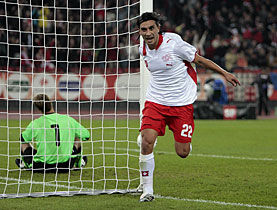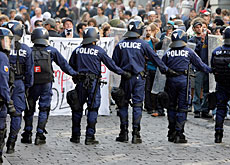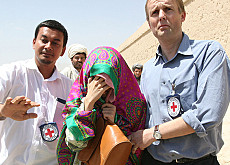Red Cross and Uefa set Euro 2008 goals

Uefa has announced it will donate €4,000 (SFr6,600) to the Red Cross for every goal scored at next year's European Championship, co-hosted by Switzerland.
European football’s governing body revealed on Wednesday that the all-Swiss International Committee of the Red Cross (ICRC) would be the official charity partner for Euro 2008 and that proceeds would go towards landmine victims in Afghanistan.
“This is a very important moment for us, to be able to show our attachment and commitment to the ICRC,” said Uefa president Michel Platini.
“This collaboration began ten years ago and I am very happy that we have reached this agreement for Euro 2008 so that we can help raise money for the ICRC – with whom we share many values,” Platini told swissinfo at the Uefa headquarters overlooking Lake Geneva.
He added that in that time more than SFr8 million ($7.15 million) had been raised. “This is not only something to be proud of for both our organisations – it is also important for the victims of armed conflicts around the world who this money has helped.”
Jakob Kellenberger, president of the Geneva-based ICRC, said: “Although we are very different bodies, it is true that we have common values: respect for rules, a commitment to fair play and a spirit of openness and non-discrimination.”
He told swissinfo: “If you take the popularity of football, it’s great for people to see that an organisation such as Uefa is standing behind a very different organisation such as the ICRC.”
The partnership’s core enterprise for Euro 2008, which will be held between June 7 and 29 at eight venues in Austria and Switzerland, is a fundraising campaign called “Score for the Red Cross”.
This lets football fans buy virtual goals for their teams online. A table system at www.scorefortheredcross.org will then show which countries have the most generous fans as the tournament progresses.
Uefa will also make a contribution by giving €4,000 to the ICRC for each goal scored during the competition. During Euro 2004 in Portugal 77 goals were scored, excluding penalties, which would have amounted to €308,000.
Awareness
Various other promotional activities are planned, including the sale of red mascot bracelets.
“The main aim is to get people involved and of course to buy artificial limbs for the victims of anti-personnel mines in Afghanistan,” William Gaillard, director of communications at Uefa, told swissinfo.
Gaillard says raising people’s awareness shouldn’t be too difficult. “Football is so popular that anything you associate with it tends to get into the limelight.”
He cites the Uefa programme against racism, which he says has done more to combat racism than anything else “because children are aware that the great stars who they love are involved in the campaign against racism”.
“As role models football players can play a tremendous part in making people more aware of these issues,” he said.
“We cannot solve the world’s problems but we can make people aware of them.”

More
International Committee of the Red Cross
Benefit of sport
Kellenberger agreed. “I do not think sport can solve humanitarian problems – you solve those by caring for the wounded in hospitals and by providing drinking water in the desert and so on – but I think you can use sport as one of the tools to prevent conflict.”
He added: “Once armed conflict has broken out it is only concrete humanitarian aid that will help people, but sport can help prevent that.”
Kellenberger said he had recently been talking to a member of his staff about a small city in the Darfur region of Sudan. “She said: ‘As long as the children in the city were playing football, you could assume that the situation was not that serious; but the day mothers did not let them leave the house to play football, you knew the tension was much worse’.”
swissinfo, Thomas Stephens in Nyon
Uefa’s close partnership with the ICRC was launched with support for the latter’s anti-landmine campaign in 1997. After it became a part of Uefa’s partnership portfolio in 2002, the ICRC shifted the focus onto children in war.
As Uefa’s charity partner for Euro 2004, the ICRC and Uefa ran a joint campaign that used referees at the tournament to raise awareness of the fact that there are rules even in war, and that these rules need to be respected to protect the vulnerable, especially children.
The campaign will receive a massive platform at Euro 2008. Six million visitors are expected in Austria and Switzerland, and the huge media coverage of the tournament will help guarantee the activities maximum exposure.
Switzerland will co-host the Euro 2008 championships, the second time the country has staged a major football tournament, after the 1954 World Cup.
The qualifying phase of the tournament began in autumn 2006 and will end on November 21, 2007. Co-hosts Austria and Switzerland qualify automatically.
The winners and runners-up in the seven qualifying groups – 16 teams – will go through to the Euro 2008 final round. A draw will take place in Lucerne on December 2, 2007 to decide the composition of the groups for the finals.
15 of the 31 Euro 2008 matches will be played in Switzerland and 16 in Austria. Switzerland will play the opening match of the tournament at Basel’s St Jakob’s Park on June 7. The final will be in Vienna on June 29.
Swiss stadiums: Zurich – Letzigrund (30,000 seats); Basel – St Jakob’s Park (40,000); Bern – Stade de Suisse (30,000); Geneva – Stade de Genève (30,000 seats).
A Federal Sport Office report in May reckoned the event could generate revenue of SFr1.5 billion ($1.24 billion) with profits of SFr860 million for the country.

In compliance with the JTI standards
More: SWI swissinfo.ch certified by the Journalism Trust Initiative




You can find an overview of ongoing debates with our journalists here. Please join us!
If you want to start a conversation about a topic raised in this article or want to report factual errors, email us at english@swissinfo.ch.